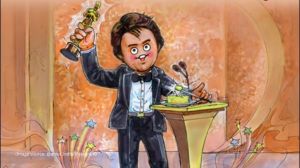The unbearable sickness of laughter
The spectacular opening scene of Victor Hugo's Notre Dame de Paris is about the Parisian underworld denizens and students watching a stage p...

The spectacular opening scene of Victor Hugo’s Notre Dame de Paris is about the Parisian underworld denizens and students watching a stage performance, freely interfering with it. Soon, as part of a mammoth festival, they will select the Fool’s Pope in a tight contest. Through an opening in a wall, the contestants will face the audience and make faces at them, one after the another. The man behind the funniest and most grotesque face will be adjudged the Fool’s pope… Are we taking part in the greatest anti-authoritarian gala ever depicted in world literature, or looking at ourselves in the mirror as we face the mid-term election?
That laughter is an anti-authoritarian act is one of the truly heraldic discoveries of our times. Another equally interesting discovery, made by media researchers, implies that laughter could be an efficient means of mass manipulation. This is substantiated by specimens of some highly successful ads which verge on cartoon strips or make use of visual elements quite unique to cartoons (the trick is to trap the child in the adult, through a process of informalisation). Put together, these two mismatching discoveries make a deadly duo in humour industry, be it in politics, literature or the media. Because it allows the vulgar (dubbed popular), motivated humourist to enact an authoritarian drama against the backdrop of supposedly democratic razzle-dazzle and, still worse, get away with it.
Now, how all this fits in with our politicians’ recently developed proneness for jokes and humour? Yesterday, even the most caddish or boorish of them bore a smug seriousness that looked convincing, nearly reassuring. At least, it gave you the feeling that politics was serious. But, all of a sudden, our politicians have started cracking jokes — in utterly serious situations, mind you, or haven’t you noticed it? Ask a question, about a rape or murder case, or about other politicians and their scam pedigrees. Pat comes the joke which obviously entertains a highly receptive audience — receptiveperhaps because they too are vulgar to the core or because they feel it downright greedy to expect anything better from the politicians. At any rate, the joke conceals the authoritarian bearing of the joker. The politicians in their fancy (which could have accommodated virtual reality decades before it was born in the computer) may regard it as a tradition-bound reversal, one that would take them to the golden age of wizard jesters like Birbal and Tenali Raman. Will they compare?
Notwithstanding their official designation as jesters, the genuine Birbals and Ramans never felt it incumbent upon them to resort to coarse jokes to entertain and engage an audience. The tales that got amassed in our childhood memories speak of two wise, brilliant men to whom humour was a matter of stylistics, not a way, the easiest and most inexpensive way, of manipulating masses through vulgar laughter. Their eye-openers were fine paradigms in problem solving, often couched in a kind of fuzzy logic too advanced for their times and too dear to the very advanced.
But now we have only witless jokers – not a very heretic statement about politicians, but the joker’s etymology is more startling than any heresy.
Two common functions of the joker in card games are well-known. It will climb and squat neatly on your ear when you are busted. Secondly, a joker is a wildcard: lacking a symbol and denomination of its own, it can assume those of any card in the deck. And to top it all, the Americans have given another meaning to the word: “clause added without warning to a document, which changes its effectiveness in a way that may not become immediately apparent.” Every piece is kosher political stuff.
Back to Hugo’s Parisian night. Time for Quasimodo to appear at the wall-opening. When he peers at the audience, the immediate reaction is pure shock, because his face is inhumanly grotesque. Then follows the biggest laughter of the anti-authoritarian night, because the title-winning face is no theatrical contrivance, it is a permanent fitting. Yes, Quasimodo’s face is real. Project it in anyway you want to on to the Indian scene, but make a distinction: Quasimodo is an honourable man.



- 01
- 02
- 03
- 04
- 05




























